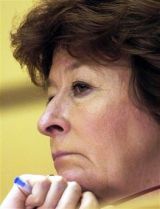Sudan must be told to stop Darfur crimes – Arbour
March 13, 2007 (GENEVA) — Governments worldwide must tell Sudan they expect “massive crimes” targeting civilians in Darfur to stop, the United Nations’ top human rights official said on Tuesday.
 Louise Arbour, the U.N. High Commissioner for Human Rights, said mobilising public opinion was key to ending abuses in western Sudan where some 200,000 people have been killed and 2.5 million driven from their homes since a revolt erupted in 2003.
Louise Arbour, the U.N. High Commissioner for Human Rights, said mobilising public opinion was key to ending abuses in western Sudan where some 200,000 people have been killed and 2.5 million driven from their homes since a revolt erupted in 2003.
“The first step is … to ensure that the public is properly informed and accurately informed on what is happening on the ground, and that governments collectively put to the government of Sudan their expectation that what is happening in Darfur will stop, that the targeting of civilians will stop,” Arbour said.
“Mobilisation of public opinion is absolutely critical,” she told Reuters Television in an interview in Geneva, where the 47-member state U.N. Human Rights Council is holding a session.
A mission sent by the Council to assess conditions in Darfur accused the Sudanese government on Monday of planning and taking part in international crimes, but Khartoum blames the abuses on rebel groups which refused to sign a 2006 peace deal.
The high-level mission, led by Nobel Peace laureate Jody Williams, said that while rebel groups were guilty of serious abuses in Darfur, the “principal pattern is one of a violent counterinsurgency campaign” being waged by government forces and their militia allies, the so-called Janjaweed.
Arbour called the report “very authoritative” and said it added weight to growing evidence of “massive crimes against humanity” in the vast desert region bordering Chad.
“It is for the Human Rights Council to decide what response it will have to the report and what follow-up action it will want to endorse,” the former Canadian Supreme Court judge said.
The Sudanese government has resisted calls for a U.N. force in the region, where the African Union has been struggling to contain violence with some 7,000 peacekeepers.
Arbour said legal wrangling over whether Darfur crimes should be called genocide — as Washington contends — should not cloud proceedings at the International Criminal Court (ICC), which last month summoned a junior government minister and a Darfur militia leader to answer war crime charges.
“The difference between genocide and crimes against humanity such as extermination, murder, rape, torture and persecution is merely a matter of whether it was intended to target a specific ethnic group for elimination,” she said.
“It does not diminish in one way or another the severity or the harm inflicted to the civilian population who are victimised. Crimes against humanity can have the same magnitude as genocide,” she said.
Khartoum has said it will not hand anyone over to the Hague-based ICC, and would instead hold its own trials over Darfur abuses.
(Reuters)
